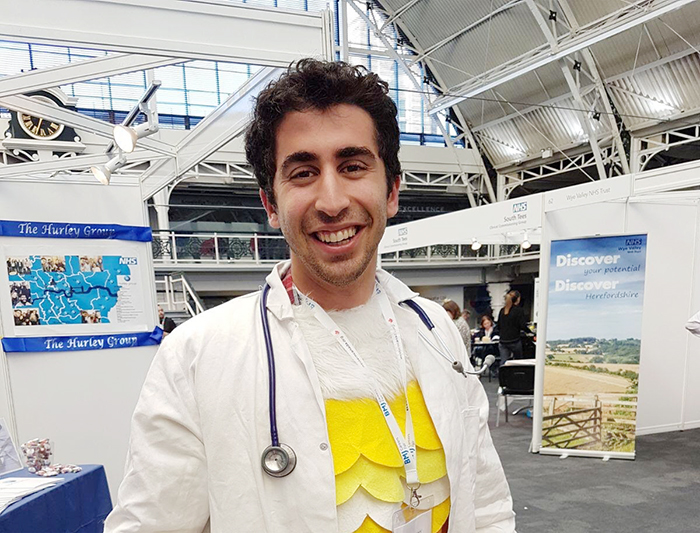
Practicing in the UK, Omani doctor Ahmed Shahrabani has been named in Forbes’ list of 30 visionaries under the age of 30 in Europe, for setting up a company that has been instrumental in helping hospitals during the pandemic. He credits his upbringing in the Sultanate, and his father, for the success he has earned so far.
In 2016, Ahmed and a colleague, Dr. Nicholas Andreou, formed Locum’s Nest, a company that puts hospitals who need cover with medical professionals willing to pick up an extra shift. In doing so, they’ve managed to cut out the expensive middleman, and by Ahmed’s own admission, have saved the UK’s National Health Service billions of pounds, while helping improve patient care, because of easier access to the right specialists.
Organisations like Locum’s Nest have been critical during the ongoing COVID-19 pandemic, where doctors, nurses and technicians are often needed at short notice to save patients’ lives. The attitude of making help available to hospitals is not just one his company stands for, it is part of Ahmed’s personal morals as well: on weekends, he works as a respiratory doctor on the COVID wards, providing help to patients who most need it.
“Today, we are working with over 40,000 healthcare workers across hundreds of hospitals and have the pleasure of working with a team of 30 inspiring and hard-working colleagues at Locum’s Nest,”he says. “I live in London at the moment, but regularly come home to Oman where I have life-long colleagues and friends.”
It is Ahmed’s efforts towards Locum’s nest that have seen him included on The Forbes 30 under 30 Europe. The class of 2021 includes 300 honourees across 10 categories, all aged under 30 years old. Against the backdrop of turbulent social and economic conditions across the region, the sixth annual Under 30 Europe list celebrates the young visionary leaders and entrepreneurs who have made their mark on business and society in the past year.
The list includes change-makers such as Manchester United and England footballer Marcus Rashford, whose campaign to provide free meals for deprived children raised £20m and forced the UK Government into a policy U-turn. These examples, as well as all under 30s honoured on the list,represent exceptional determination, creativity and leadership at a time of global uncertainty.
Ahmed’s father – the late Dr Rashid Shahrabani – and his mum, moved to Oman in 1990, where a handful of doctors were instrumental in setting up Oman’s first cardiology unit at the Royal Hospital. Born a few months later, in 1991, Ahmed attended the British School Muscat, an institution that places emphasis on a person’s ability to understand and develop the world around them.
His family were granted Omani citizenship by the late His Majesty Sultan Qaboos bin Said bin Taimour, for their services to the nation. While Ahmed did learn many lessons at school, equally important – if not more – are those he learned beyond the classroom.
He explains: “Success wasn’t deemed entirely on what grades you got. Yes, I believe academia is important and having a deep understanding of the field one is interested helps in life, but it is infinitely more important in my opinion to learn how to deal with people.
Thomas English, my physics teacher and Gaelic football mentor back then, now friend, has really helped me evolve into the person I am today. “I was also lucky enough to have been chosen to go on one of the earlier Connecting Cultures expeditions, a week-long trek in the mountains of Oman, hiking during the days and discussing education, politics and common misconceptions or understandings with 14 other impressive people from all around the world,” he adds.
“This expedition helped with my learning of other cultures around the world and how really understanding where people have come from really helps when working together for a shared goal,” says Ahmed. His thirst for knowledge saw him absorb countless lessons while exploring the world beyond the cities with which we are so familiar.
Outside the classroom, he has dozens of memories of being in the middle of the Empty Quarter, Wahiba Sands and other gloriously remote parts of Oman where the local villagers would miraculously find Ahmed and his friends, and invite them to their homes, where they would share the most intense coffee and the sweetest dates.
“I often found myself acting as translator for the group but I will always remember the kindness that can come from people and how long and impactful those memories are,” he admits. Alongside these excursions that have deeply impacted him, Ahmed feels he and his sister Deena were blessed to have a father who both led by example, as well as encouraged them to do their best.
“Seeing the way he spoke to people with dignity and compassion and seeing how others spoke to him with respect and appreciation still amazes me,” he says. “I was always into the sciences at school and loved understanding not just why things worked the way they did but crucially, how. It was the combination of the pathophysiology of diseases in conjunction with the importance of communicating with patients as humans that really drew me to it.
“I firmly believe the art of medicine is 90 percent communication and empathy, with the remaining 10 percent being the science,” Ahmed goes on to say. “Anybody can learn a textbook inside out but it’s how you deliver what you know to your patients that makes a good doctor.
“The art of communication always trumps the science, and it was this that really drew me to the profession. I’ve always liked engaging with people, learning about them, what’s important.” [email protected]